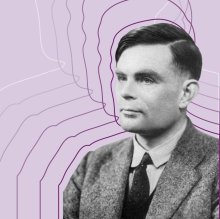
We can only see a short distance ahead, but we can see plenty there that needs to be done.
Alan Turing (KC 1931)
King’s College is celebrated for innovation, creative thinking, challenging the status quo and thinking differently, and few of the College’s alumni exemplify this more than Alan Turing.
From the papers he published at Cambridge which are now recognised as the foundation of computer science, through his vital cryptanalysis work at Bletchley Park during the Second World War and cracking the German naval Enigma code, to his exploration of the idea of artificial intelligence, the importance of Turing and his impact on our world are hard to overestimate.
As well as a pioneering thinker, brilliant mathematician and cryptographer, Alan Turing was also a gay man who was appallingly treated as a result of his sexuality. In 1954, at the age of 41, Turing took his own life after being prosecuted for homosexual acts, still considered criminal in the UK at the time. Sixty years later, in 2013, he was posthumously pardoned by Queen Elizabeth II; and in 2021 his pioneering work was recognised when the Bank of England featured him on the new £50 pound note.
King’s is hugely proud of its association with Alan Turing. In January 2024 a new 3.7 meters tall sculpture by Sir Antony Gormley was installed at the heart of the College, between the Gibbs Building and Webb’s Court. Titled True, for Alan Turing, it was commissioned by King’s as a visible recognition of Turing’s life and achievements.
Alan Turing at King's
Alan Turing read Mathematics at King’s from 1931 to 1934, having won an Open Scholarship, and gained his degree with first-class honours. Shortly after graduating, on the strength of his mathematical dissertation, he was elected a Fellow of the College.
In 1936 while at Cambridge Turing published his seminal paper 'On Computable Numbers', which introduced the key concepts of algorithms and computing machines, and gave birth to the idea of a computer.
Following two years at Princeton, Turing returned to King’s in 1938. With the outbreak of war in 1939 he went to Bletchley Park, and only spent one more year, 1947-1948, officially living in Cambridge, but he held his Fellowship until 1952, and went on spending his summers in Cambridge. At King’s, in the College’s tolerant, open and intellectual environment, he was able to life a fulfilled life both as a homosexual man and an abstract thinker. Although from 1948 he lived in Manchester, where he joined Max Newman's Computing Machine Laboratory and introduced the ‘Turing Test’ for machine intelligence, King’s remained in many ways Alan Turing’s professional, social and emotional base up to his death in 1954.